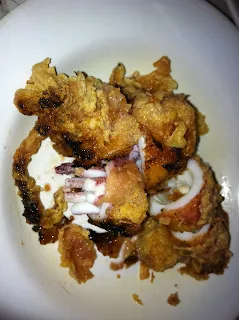
The term "Malay" can be a hotch-potch of several influences and cultures in South-east Asia and its definition can vary, depending on context, purpose and academic intent. It can encompass Javanese backgrounds from the days of the Majapahit Empire, the Bugis from Sulawesi, the Minangkabaus from Sumatra, Siamese connotations, Arab trading connections and the intermarriages with Indians and Chinese during the days of the Malacca Sultanate. These groups of people living in south-east Asia were largely Hinduised or had animistic beliefs before the advent of Islam on the sea routes across the Indian Ocean and on to the Straits of Malacca. Such a rich background has also resulted perhaps in one of the world's strongest blends of fusion food, which in contemporary times has been categorised as Malay food. Above image, the crunchy deep fried squid.







Eggs, whether as fried omelettes or as hard boiled wholes, are popularly immersed in a light chili based curry to accompany with steamed rice. (image above) The most popular dish in this range is the telor Belada, which can be kept for eating for a few days.


There are key elements of Malay cuisine, ranging from the hot to sour and savoury. The belacan (picture above) is a primary condiment to accompany any other dish - be it a salad, curry, main dish or entree - at the dining table. Made up of pound chillies and shrimp paste, and given a dressing of kaffir lime juice, it sets the tone for the palate. Essential ingredients in this cuisine are lemongrass; a wild ginger called the bunga kantan; coconut milk; tamarind paste and juice; cumin (jintan putih); fennel (jintan manis); wet tumeric (kunyit); daun kesum ( or laksa leaf); and freshly grated coconut known as the kerasik. Such a variety of ingredients are mixed and pound by mortar and pastel traditionally in to a concoction called the rempah, which is required to be made ready before actually cooking. You may note the Thai, Indian and Portuguese influences in the choice of ingredients mentioned.


The ayam masak merah, or red sauced cooked chicken ( above), can e made at home utilising the following recipe, taken from Ivan Cho's CintaDapur:
Ingredients:
3 pieces chicken leg (cut into bite size chunks)
2 tbs turmeric powder1 onion (half cut into strips, the other half cut fine)
3-4 dried chili (crushed)
2 birds eye chili (sliced fine)
1 x thumbsized ginger,
sliced fine4 X chopped tomatoes
2 tbs tomato paste
2 tbs tomato sauce
3 tbs sweet soya sauce (also known as kecap manis)
1 tbs sugar
Vegetable oil
Method:
Marinade chicken in turmeric powder for half hour
In a mortar, make a paste by griding half an onion, dried chili, birds eye chili and ginger into a paste.
Alternatively, place them all into a blender with 1 tbs of vegetable oil
Heat up a pot with 4 tbs of oil then shallow fry the chicken till brown and crispy; well yellow and crispy in this instance (chicken does not need to be complete cooked at this stage) – If your pot is not big enough, consider frying the chicken in batches.
Remove the chicken and let it rest on paper towels
With the remaining oil, add in the spice paste and allow to fry for 1-2 minutes
Add in the tomato paste, tomato sauce, chopped tomatoes, sweet soya sauce and sugar and give it a good stir
Add in half cup of water and allow the mixture to simmer until it thickens into a gravy like texture
Add in chicken and allow to cook thoroughly.
Serve with steamed rice

Favourite dishes fro me when growing up in Malaysia include the nasi lemak; belacan kangkong; ikan bakar or deep fried fish (picture above), with a stuffing of selected rempah and garlic fries as dressing; mutton soup; nasi kerabu; beef or chicken satay in skewers; beef rendang and sambal prawns. The taste obtained for such dishes can change from region to region within Peninsular Malaysia, and Penang versions can be so different from those in Johor or Pahang or Kelantan. Impressions on non-Malaysians of this cuisine can be described in two significant words - tangy and pungent.




No comments:
Post a Comment